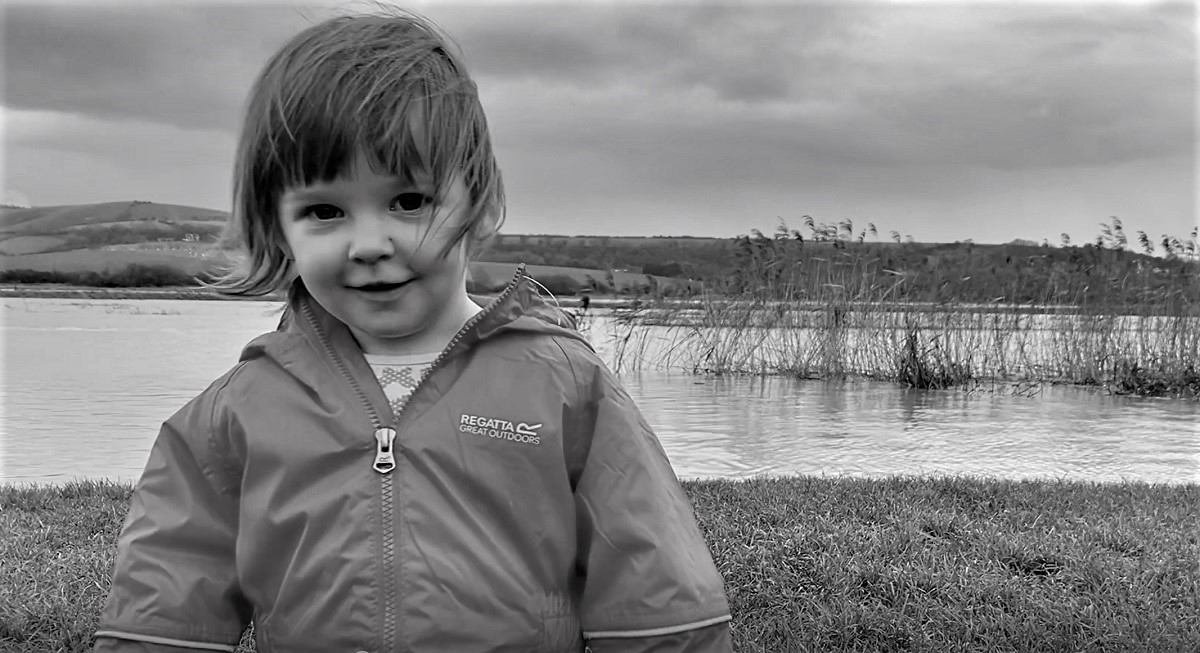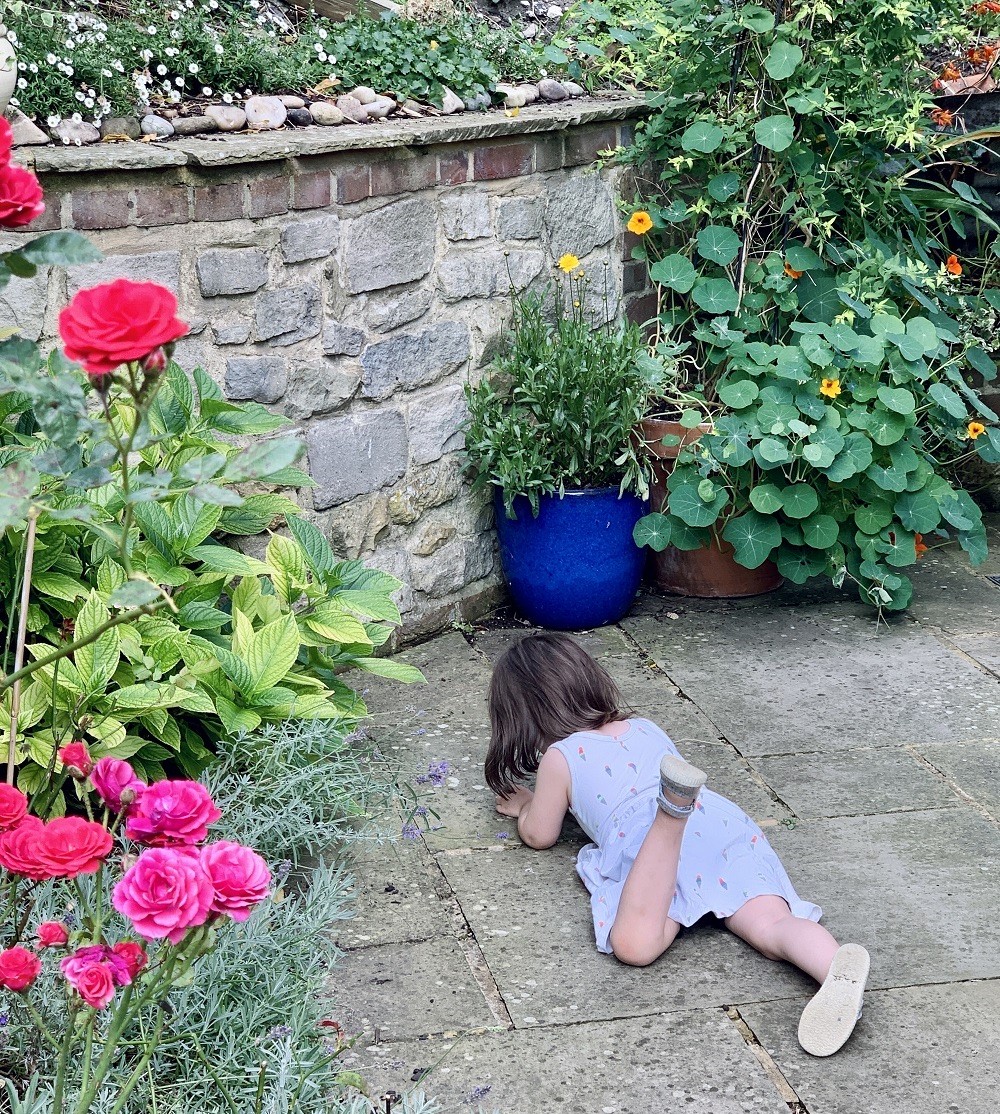"The mind of a child is like a kiss on the forehead - open and disinterested. It turns as the ballerina turns, atop a party cake with frosted tiers, poisonous and sweet."
Patti Smith
“Think…as a child might…,” the poet Rainer Maria Rilke bade us when dispensing advice on improving creativity. There is no shortage of applying wonder, curiosity, and ease—traits we associate with childhood and a childlike mind.
But what is the mind of a child as it registers the world? Can we access it as adults?

I watch my daughter register her senses. What makes her run, stops her, draws out her hand from the safety of a pocket, and back in again with chosen treasures? Trust? Newness? Innate coolness of things?
Biologist Rachel Carson delighted in showing nature to her young nephew, and as she watched him traipse about on Maine’s shores, she noted:
A child’s world is fresh and new and beautiful, full of wonder and excitement. […] There is the world of little things, seen all too seldom. Many children, perhaps because they themselves are small and closer to the ground than we, notice and delight in the small and inconspicuous.
From Rachel Carson’s The Sense of Wonder
Carson's book was the gift of her life, her most important personal project. It captures a child's wonder and explores how to access it throughout life. I think of a young David Attenborough traipsing in the fields, “just turning over a stone and looking at the animals beneath.” Stones that Mary Oliver lamented sat deep beneath the surface, waiting to be touched.
When naturalist Gerald Durrell was nine, he moved with his family from Britain to the Mediterranean island of Corfu. Unburdened by school or supervision, he began his grand love affair with the out of doors. Durrell became a professional writer and naturist, and even as an adult, his books are flooded with childlike wonder and delight.
At first I was so bewildered by this profusion of life on our very doorstep that I could only move about the garden in a daze, watching now this creature, now that, constantly, having my attention distracted by the flights of brilliant butterflies that drifted over the hedge. Gradually, as I became more used to the bustle of insect life among the flowers, I found I could concentrate more. I would spend hours squatting on my heels or lying on my stomach watching the private lives of creatures.
From Gerald Durrell's My Family and Other Animals
A child-like mind registers the world with interest, energy, and an overall lightness of being.

What allows that? Free time, unstructured play, unburdened by feelings of consciousness?
Physicist Richard P. Feynman makes the case that the desire to know can drive children about (and that this “pleasure of finding things out” lingers, if nurtured, in adults too).
It is a great adventure to contemplate the universe beyond man, to think of what it means to be without man – as it was for the great part of its long history, and as it is in the great majority of places. When this objective view is finally attained, and the mystery and majesty of matter are appreciated, to then turn the objective eye back on man viewed as matter, to see life as part of the universal mystery of greatest depth, is to sense an experience which is rarely described.
From Richard Feynman’s The Pleasure of Finding Things Out
But knowing as a child is not nearly the same as knowing as an adult.
Rachel Carson saw first-hand that childlike knowledge centers on how things relate to the child's knowledge. My daughter reminds me of this as she tells us a van, tree, telephone pole, and even cloud is either a “Mommy” or a “Daddy” specimen, occasionally “baby.”
 Caterpillars.
Caterpillars.Children seem to possess inquisitive minds coupled with tunnel vision as they grasp knowledge and enter it into a puzzle that adults have formed: a sense of self, an understanding of the world, and a sense of the people they know.
“For children, it’s the distance that holds little interest,” observed Rebecca Solnit.
There is no distance in childhood: for a baby, a mother in the other room is gone forever; for a child, the time until a birthday is endless. Whatever is absent is impossible, irretrievable, unreachable. Their mental landscape is like that of a medieval paintings: a foreground full of vivid things and then a wall.
From Rebecca Solnit’s A Field Guide to Getting Lost
When British writer Laurie Lee, a writer of life lived and lost, mentions tracing the knots on his bedroom ceiling and how that space was his entire universe, it shows not only Lee’s absorption in the immediate but also his disinterest in everything else.
These knots on the bedroom ceiling were the whole range of a world, and over them, my eyes went endlessly voyaging in that long primeval light of waking to which a child is condemned. They were archipelagos in a sea of blood-coloured varnish, they were armies grouped and united against me, they were the alphabet of a macabre tongue, the first book I ever learned to read.
From Laurie Lee’s Cider with Rosie
To me that narrow scope is the essence of Patti Smith’s few lines: “The mind of a child is like a kiss on the forehead—open and disinterested. It turns as the ballerina turns, atop a party cake with frosted tiers, poisonous and sweet.”
The connections we might make as an adult—we see a flower, which tells us it is spring, which tells us the days will be longer, which tells us we might be happier… etc., etc.—for a child becomes I see a flower, I will grab it! (And invariably I will bring it home with me!)
So, can we adults ever narrow our universe and traipse along like a child?
“My child self is unreachable,” Penelope Lively wrote in her generous study of memory, a sentiment echoed by Wislawa Szymborska in her beautiful poem about reaching out to her younger self, a self that will neither listen nor understand.
Of course, these writers are writing as mature adults about childhood, not within a state of childhood. Excellent memories and reality notwithstanding, it is imagination that fuels their narrative. Imagination and memory.

A childlike mind is a bitterly beautiful thing that is unreachable, but that does not mean it is unavailable.
Rather than look at it as “I was a child, now I am an adult,” like it’s a past we have to claw forward, what if we look at our current selves as children to the future?
More specifically: What if we imagined ourselves ignorant?
What if we acknowledge our limits of consciousness and embrace them? What if we traipsed into the complex field of the unknown slowly, eagerly, with a narrowed focus? What might happen then?
I don’t know. Do you?


